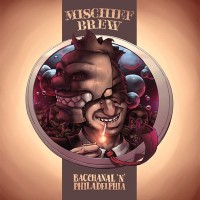Mischief Brew has always been a difficult band to categorize. Frequently, people staple the term “folk punk†to the band. But, listen to the chaotic psychosis of The Stone Operation, or the clean propulsion of This is Not For Children and not only is it evident that the term is reductive, but that it never really quite fit the band. To be fair, their new archival release Bacchanal ‘N' Philadelphia which combines their first two main releases, does show the origin of how Mischief Brew became associate with a certain scene, but more interesting, for each folk punk Goddess the band acknowledges, they also pay respect to anti-folk punk demon-god Anarcho-punk.
Side A of the release is a remaster of frontman Erik Petersen’s side of Bellingham & Philadelphia. Here Petersen, along with frequent co-conspirator Denise V, focuses on storytelling. “Old Tyme Mem’ry†finds Petersen portraying the part of a skilled artisan lamenting the loss of craft in the face modern “Advances.†(Though, if you know anything about Petersen’s day job, the song might not be an “Act.â€) Petersen has always been a master of melody, but here he focuses o traditional song constructs, so that the song rises and falls in a natural wave much in the same way as ancient songs, which of course, is the reason why “Junco Partner†is still around today. But every time he ventures into gentle or soothing textures, Petersen seems wary of becoming too soft, and despite the acoustic performance, goes for the bombastic. “Boycott Me!†is a harsh smasher where you can hear the artist snapping down on the strings as hard as he can.
And it’s key to pause here and focus on one of Mischief Brew’s core constructs. “Boycott Me!†is unquestionably a working class manifesto, with lyrics borrowed directly from working class manifestos. Petersen isn’t shy about showing his influence or being direct. Instead of drawing some extended metaphor, he basically gives the middle finger to capital inequity. But then, just as the release seems that it will be a Crass-style “I hate you Margaret Thatcher!†release, Petersen unveils “Dirty Pennies†which, unlike the macro-focus of its predecessor, attacks class constructs through two people along. Still, note the similarity of theme.
In contrast to the Philadelphia side’s more somber approach, the Bakenal side finds Petersen and Denise V loosening up a little and starting a fire here and there. “Devil of a Time†already finds the band deviating from the “folk punk†template by playing around with 20’s jazz swing and 20’s Blues repetition. The result is a tune that revels in whimsy and destruction. As Petersen runs amok through the down, pounding shots and assaulting guards, he’s quite a different character than the flip side. Where he once was a sort of wounded character, expressing woe for modern man’s situation, on the apropos Bakenal side, he slips on a pair of horns and becomes a sort of imp, laughing at the ridiculousness of life and causing as much trouble as he can.
This is expressed even more directly with one of the band’s all time greatest hits, “Roll Me Through the Gates of Hell.†As the chaos blows up around him, Petersen toasts the eruption, seemingly saying that any change at all is better than a static society. And just as great Bacchus indulged, Petersen becomes a more randy and violent character, “There’s nothin’ like a lady with a buzzsaw! I just might build your house and I just might tear it down!â€
As umpteen artists have tried to show, there’s a certain gravitas or wisdom in a downcast, solemn delivery- which Petersen achieves on the first side. But, on side B, where he leaps from the chair and dances around the room, growling, and spitting, and hissing, it’s clear that there’s just as much intelligence in raucous romping as there is in serious, slow, solemn delivery.
Yes, certainly, there are moments of “folk punk†on the release, but really, as the band nods to Utah Philips and the likes, it really seems there’s more “folk†than “folk punk†here. And, when the band gets rocking, it’s not so much a genre exercise as it is just a natural combustibility. “Devil of a Time†with its brutish smashing, is more of an anarcho-buzz than it is faux-hillbilly music. And, of course, you could say, well, “Anarcho-punk and folk-punk are linked, you dummy†Maybe so, but that’s noly because bands like this sort effortlessly merged the two without caring about the pre-prepared boxes. You can try to add any label you like to that, but’s it’s after the fact marketing. Mischief Brew has doubtlessly grown since their earliest releases. But, as this release makes clear, their dedication to certain conceptual ideas, and disregard for convention, has always been there.
